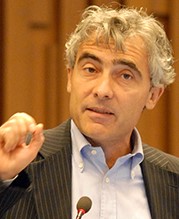22. November 2024 | International and Regional Labour Markets
ELMI Policy Panel: Are labour shortages a problem everywhere?

The 2024 conference of the European Association of Labour Economists (EALE) was held from the 5 to 7 September in Bergen, Norway. The policy session on “Labour Shortages: A Problem everywhere?” was organized and chaired by Bernd Fitzenberger (IAB) on behalf of the European Labour Market Institutes (ELMI) network. Presentations were made by Tito Boeri (Bocconi University, Milan), Stéphane Carcillo (OECD, Senior Official from the Employment, Labour and Social Affairs Directorate), Bernd Fitzenberger (Institute for Employment Research and Friedrich-Alexander-University Erlangen/Nuremberg), and Barbara Kauffmann (European Commission, Brussels, Directorate F – Employment and Social Governance, Analysis).
The panel examined the important issue of labour shortages, which affect nearly all OECD countries. The discussion focused on several issues. One was potential causes, including large demographic shifts in the population, the need for workers to adapt to rapid economic transformations, and an increased demand for labour-intensive services in ageing societies. Another issue was modest productivity growth despite technological advances, including growing adoption of artificial intelligence as well as broader digitalization efforts. Finally, the panel also focused on a range of potential policy measures aimed at alleviating labour shortages and supporting sustainable economic development.

Dr Barbara Kauffmann is the director of the Directorate F – Employment and Social Governance, Analysis at the European Commission in Brussels.
Labour and skills shortages in the EU
Barbara Kauffmann gave a presentation on “Labour and Skills Shortages in the EU.” The presentation examined the growing labour shortages across EU Member States over the past decade. These shortages represent a potential challenge for business operations, investment, and the EU’s overall competitiveness. There are several key drivers. One is demographic shifts, particularly the decline in the working-age population. Another is the prevalence of poor working conditions in sectors facing severe shortages. Further, some groups are underrepresented in the labour market, such as people with disabilities and older workers. Kauffmann also noted that structural changes in the demand for skills, especially within green and digital transition sectors, are fuelling the shortage. Policy solutions focused on proposals to improve working conditions, enhance mobility within the EU, support skills training, and attract talent from outside the EU.
Presentation of Barbara Kauffmann

Dr Stéphane Carcillo is the Head of the Jobs and Income Division at the OECD.
Labour shortages in the OECD
Stéphan Carcillo focused on “Labour Shortages in the OECD”. Using evidence from the 2024 OECD Employment Outlook, the presentation provided an overview of the labour market challenges faced by OECD countries. Although there are signs of easing, the labour market remains tight, particularly in specific sectors. Carcillo noted that while low-pay industries are no longer the primary sources of shortages, substantial pressures continue in sectors like healthcare, education, and professional services. Carcillo highlighted several key drivers of these shortages, including demographic shifts like aging populations and changes in labour force participation, new skill requirements prompted by AI, digitalization, and the green transition, structural shifts and job transitions, and changes in worker preferences—such as demands for improved working conditions. To address these challenges, Carcillo suggested policies to encourage geographic mobility, to activate underrepresented groups in the workforce, and to improve job quality to attract workers.
Presentation of Stéphan Carcillo

Tito Boeri is a Professor in the Department of Economics at the Bocconi University in Milan.
From labour slack to labour shortages in the EU
Tito Boeri‘s addressed the topic “From Labour Slack to Labour Shortages”. The presentation examined the widespread labour shortages now impacting various sectors across Europe. Boeri suggested that these shortages are more structural than cyclical, as many high-demand occupations were already experiencing similar challenges before the post-COVID-19 recovery. The presentation identified key factors driving these shortages, including skill mismatches, demographic changes like an ageing population, and poor working conditions in low-wage occupations such as sales, cleaning, and cooking, which deter potential workers. The evidence also indicated that shortages in certain fields are made worse by a lack of specialized training, especially in healthcare and engineering. Policy solutions focus on expanding vocational training, increasing labour force participation (particularly among women), improving workplace conditions, and raising immigration levels to mitigate the effects of an ageing workforce.

Professor Bernd Fitzenberger, PhD, is the Director of the IAB and Professor of Quantitative Labor Economics at Friedrich-Alexander-Universität Erlangen-Nuremberg.
Labour shortages in Germany
Bernd Fitzenberger focused on “Labour Shortages in Germany”. The presentation examined the labour market challenges Germany is facing. Despite record-high employment levels, Germany is experiencing a severe shortage of skilled workers, particularly in sectors such as construction and hospitality. This shortage is exacerbated by a persistent mismatch between job openings and the qualifications of job seekers, as indicated by high unemployment rates among unskilled labour. Other structural challenges include a decrease in worker mobility (since 2019), an ageing population, and a decline in apprenticeship programmes. While there were fewer job vacancies in the second quarter of 2024 compared to the previous year, labour shortages are expected to continue in the coming years.
Presentation of Bernd Fitzenberger
Outlook
In sum, the panel discussed the critical issue of labour shortages in many OECD and EU countries. Primary explanations include ageing populations, changes in worker preferences, and structural changes in the demand for skills from transitions into digital and green technologies, especially in areas like healthcare. Proposed solutions include improving working conditions, skills training, increasing labour mobility, and labour force participation, especially among older workers. The 2025 annual conference of EALE will be a joint conference with SOLE and AASLE taking place from 27 to 29 June 2025 in Toronto (Canada). The 2025 ELMI conference will take place at the Institute for Structural Research (IBS) in Warsaw (Poland) and will be co-organized by the IAB.
Picture: Andrii Yalanskyi/stock.adobe.com
DOI: 10.48720/IAB.FOO.20241122.02
Fitzenberger, Bernd (2024): ELMI Policy Panel: Are labour shortages a problem everywhere?, In: IAB-Forum 22nd of November 2024, https://iab-forum.de/en/elmi-policy-panel-are-labour-shortages-a-problem-everywhere/, Retrieved: 11th of February 2026
Diese Publikation ist unter folgender Creative-Commons-Lizenz veröffentlicht: Namensnennung – Weitergabe unter gleichen Bedingungen 4.0 International (CC BY-SA 4.0): https://creativecommons.org/licenses/by-sa/4.0/deed.de
Authors:
- Bernd Fitzenberger

 Professor Bernd Fitzenberger, PhD, is Director of the IAB.
Professor Bernd Fitzenberger, PhD, is Director of the IAB.